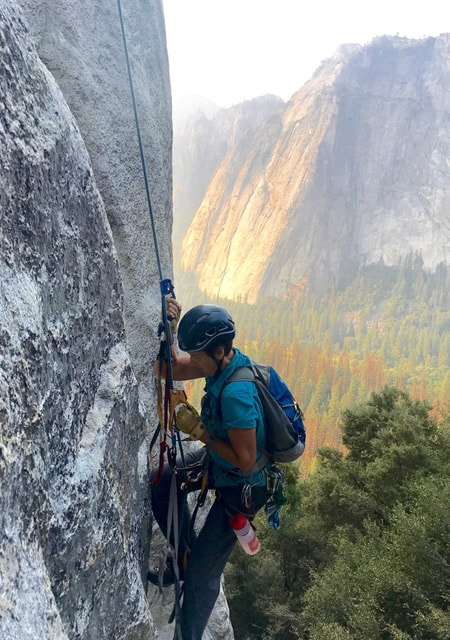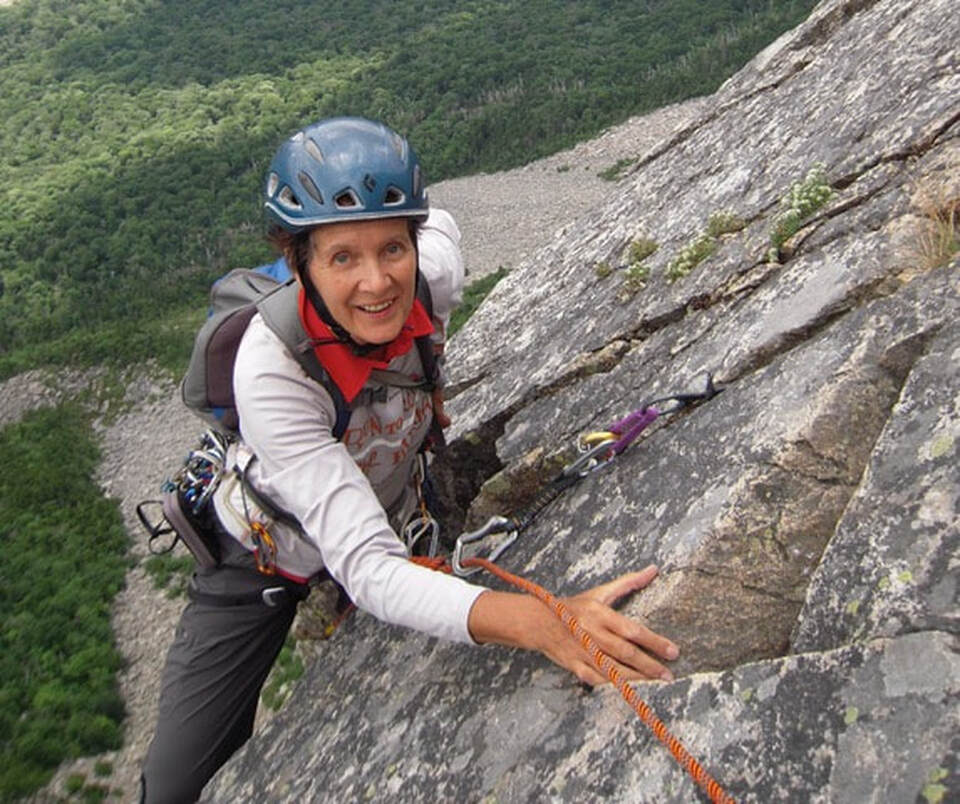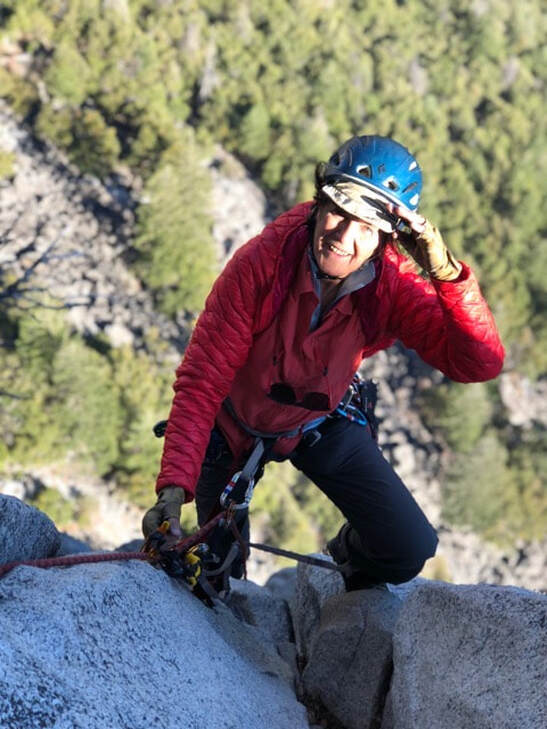ABOVE: Author Diedre Wolownick on the classic Gunks, New York climb, High Exposure. Photo: Eileen Conway
Dierdre started long-distance running at 55, and has completed numerous marathons, half-marathons and other races. She started rock climbing at 59, with her son Alex Honnold, and at 66, became the oldest woman to ever scale El Capitan, Yosemite’s iconic 3,200-ft granite wall. In 2021, she scaled it again for her 70th birthday. Encouraging words helped her accomplish those feats.
|
We’re running through downtown Portland this evening, my daughter, myself and thousands of other runners. June 2, the Starlight Run. Everyone knows it doesn’t (normally) get really hot in Portland. Today, though, it’s in the 90s. Sweat drips from my hair, my chin, into my eyes; everything I’m wearing is soaked.
I slow a little; if it doesn’t get noticeably cooler in the next five minutes, I’m calling it. I’ll walk back to the start, find my friends. They’ll understand. I’m not a real runner anyway. Too old. Too unfit. Not dedicated enough. My shoes are too clunky. I hate the heat. I don’t run in extreme heat or cold; I’m a fair-weather runner, and this is definitely not fair weather. Then we turn the corner, the people in costumes and all the other runners and me, into a canyon of tall buildings. People are still at work, up there. And they’re cheering! They’re hanging out of all the windows, waving and cheering as if they know each and every one of us! They’re throwing confetti down into the streets, yelling encouragement, shouting names of friends they know are running, identifying some of us by costume or hair color or whatever they can see. They’re rooting for us! Me! They’re cheering me! |
Suddenly my feet move faster. I look up, smile at them. My head comes up, my back gets a bit straighter, my stride gets a bit longer. I’m really running.
They’re cheering me!
I run on, through the canyon of buildings, back out into sweltering Portland. The sweat stinging my eyes no longer matters. I completely forget the pain in my feet. Now and then a swirl of confetti falls from my shoulders or my hair, and I imagine the cheering, smiling people in their air-conditioned offices. I run faster and harder than I thought I could, on and on — to the finish line!
Would I have finished, otherwise?
Surely I’m disciplined enough to carry through with a project, to finish what I start, without them. I didn’t know any of those people hanging out the windows, shouting, holding up signs. They meant nothing to me.
And yet, there I was, bent over, struggling for breath, sweat dripping onto my shoes, grinning — at a finish line I thought I’d never see. Maybe those cheering onlookers really did matter. Maybe we all do.
This truth also surprised me when I started rock climbing. Some partners manage the rope for you without a word, as you climb. They chat with the others on the ground. They watch you, maybe thinking about other things. You know they’ll catch you if you fall. But they don’t participate.
They’re cheering me!
I run on, through the canyon of buildings, back out into sweltering Portland. The sweat stinging my eyes no longer matters. I completely forget the pain in my feet. Now and then a swirl of confetti falls from my shoulders or my hair, and I imagine the cheering, smiling people in their air-conditioned offices. I run faster and harder than I thought I could, on and on — to the finish line!
Would I have finished, otherwise?
Surely I’m disciplined enough to carry through with a project, to finish what I start, without them. I didn’t know any of those people hanging out the windows, shouting, holding up signs. They meant nothing to me.
And yet, there I was, bent over, struggling for breath, sweat dripping onto my shoes, grinning — at a finish line I thought I’d never see. Maybe those cheering onlookers really did matter. Maybe we all do.
This truth also surprised me when I started rock climbing. Some partners manage the rope for you without a word, as you climb. They chat with the others on the ground. They watch you, maybe thinking about other things. You know they’ll catch you if you fall. But they don’t participate.
Others do. They encourage, cheer, shout helpful things, suggestions or other beta they think you might need. Or they just shout silly things to make you smile and forget what you were afraid of. To help you keep going. They help you climb. Like those office-workers helped me run.
This is why I climb better, harder, more capably with my son than with some of my other climbing partners. Many of my partners worry about me. They say that a climb is too hard for me, the approach too gnarly. That I’ll get too tired, or (at my age, they mean but don’t say) I shouldn’t be doing this or that. Alex always assumes that I can reach the top of whatever challenge we set for ourselves. If he has doubts, he never voices them. Whether I’ll reach the summit, like that finish line, is never in question when we adventure together.
Knowing that makes me believe it, too.
When you know that someone else is pulling for you, hoping for you, things go better. Every parent knows this; kids need a great deal of encouragement, at every step in their development, at every age. Teenagers like to pretend they’re too old to have a grown-up rooting for them, urging them forward, upward; fortunately, their parents know better.
Do we outgrow that need?
I thought so. Until I became a senior athlete. A 'master' runner. An older climber.
Age is meaningless. I’ve always known that. Maybe it has something to do with the fact that numbers have always been a mystery to me. I can crunch them, if need be, I can balance my bank account — but when I read a bunch of numbers on a page, my brain glosses over them as just so many meaningless squiggles. Age is just a number. Just a bunch of squiggles. No meaning whatsoever.
At any age — whatever the squiggles say — others influence us more than we might realize. When you’re at the end of your rope, digging deep, other people’s voices matter. Deep in our psyches, we’re tied to each other. Linked. Joined in a union that defies age, gender, color, language, or any other category we use to separate people. Strangers affect us more than we care to admit.
This is why I climb better, harder, more capably with my son than with some of my other climbing partners. Many of my partners worry about me. They say that a climb is too hard for me, the approach too gnarly. That I’ll get too tired, or (at my age, they mean but don’t say) I shouldn’t be doing this or that. Alex always assumes that I can reach the top of whatever challenge we set for ourselves. If he has doubts, he never voices them. Whether I’ll reach the summit, like that finish line, is never in question when we adventure together.
Knowing that makes me believe it, too.
When you know that someone else is pulling for you, hoping for you, things go better. Every parent knows this; kids need a great deal of encouragement, at every step in their development, at every age. Teenagers like to pretend they’re too old to have a grown-up rooting for them, urging them forward, upward; fortunately, their parents know better.
Do we outgrow that need?
I thought so. Until I became a senior athlete. A 'master' runner. An older climber.
Age is meaningless. I’ve always known that. Maybe it has something to do with the fact that numbers have always been a mystery to me. I can crunch them, if need be, I can balance my bank account — but when I read a bunch of numbers on a page, my brain glosses over them as just so many meaningless squiggles. Age is just a number. Just a bunch of squiggles. No meaning whatsoever.
At any age — whatever the squiggles say — others influence us more than we might realize. When you’re at the end of your rope, digging deep, other people’s voices matter. Deep in our psyches, we’re tied to each other. Linked. Joined in a union that defies age, gender, color, language, or any other category we use to separate people. Strangers affect us more than we care to admit.
|
Will a day come when I no longer need encouragement? Or is that a lifelong need? For where I am in life right now, it can be the difference between doing a climb, or backing off. Finishing a race, or walking back to the car.
Or writing another blog. Or essay. Or book. Writing is the loneliest job. One works alone, at a desk, at the kitchen table, in a car or in a café hunched over a keyboard, making thoughts visible. Alone. If you’re lucky, you have an editor who will read and enthuse. Or critique and encourage. If you’re lucky, you have an audience to read your words and react. Even luckier, people pay you for it. People are the common factor in this equation. We need each other. I always suspected that was true. But it took becoming an athlete for me to realize just how deeply that need runs through all of us. No matter how old — or young — we are. |
The Sharp End of Life (Mountaineers Books) is Dierdre’s memoir about her experiences learning to climb with her son, Alex Honnold, and raising two extreme athlete kids. Available anywhere you buy books (paper or audio).



